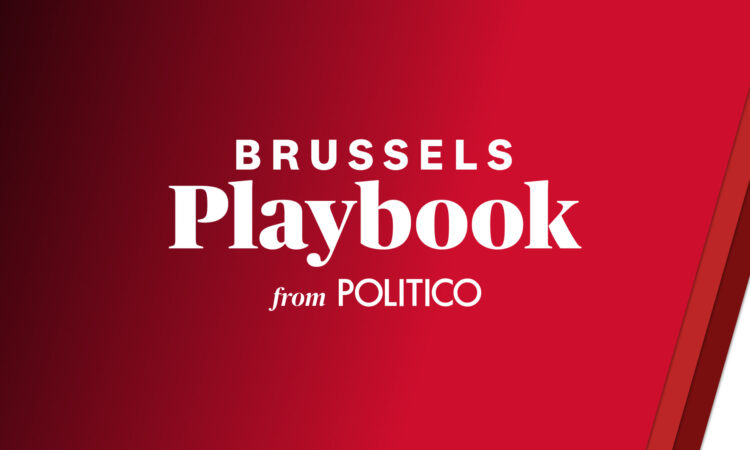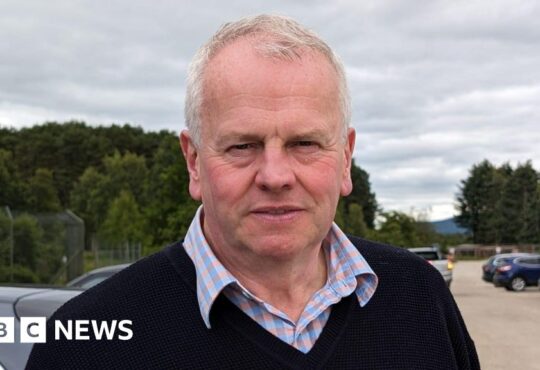
Press play to listen to this article
Voiced by artificial intelligence.
COMBUSTION TROUBLE
CAR CLASH OVERSHADOWS SUMMIT: While the risk of a new banking crisis will focus minds today, it was a standoff between defenders of the combustion engine — a group led by Germany — and those who want to phase it out completely by 2035 that dominated the EU leaders’ gathering in Brussels on Thursday night.
The situation: After previously agreeing to the phase-out, Germany pulled a U-turn and is now demanding the bloc insert an exemption for so-called e-fuels — synthetic fuels that, in theory, produce no CO2 emissions — to keep its engine-centric auto sector ticking over. That’s rattled countries who considered the deal done, including France, which is now challenging Berlin with its own demand: to have nuclear energy accepted as a “green” source of energy.
On the sidelines, leaders pushed back against Berlin. “If one member state can do it, what will stop the next?” said Latvia’s Prime Minister Krišjānis Kariņš. “This is not a direction we need to go in. The entire architecture of decision-making would fall apart if we did.”
No going back: Roberta Metsola, president of the European Parliament, also grumbled: “We cannot go back on deals because this is ultimately about trust between co-legislators and the credibility of the legislative process.”
**A message from Equinor: As Europe strives to protect and decarbonise its industrial base on its pathway to Net Zero, our cooperation plan with RWE represents a unique example of how #together we can develop a decarbonised energy system for Europe that creates jobs, stimulates industry development and ensures value creation.**
Car posse: But German Chancellor Olaf Scholz is not alone in seeking an extension for the combustion engine. Italian Prime Minister Giorgia Meloni said banning it by 2035 would leave the EU entirely reliant on electric vehicles — a technology China currently dominates. Slovakia and the Czech Republic, both car-making countries, are also skeptical about the 2035 phaseout. Read the full story by Hans von der Burchard, Joshua Posaner and Gregorio Sorgi here.
Nein to Commission proposal: In correspondence to the Commission late Thursday evening, seen by POLITICO, Germany’s transport ministry formally rejected the Commission’s latest attempt to compromise in the battle. Germany said it would continue to block the 2035 measures unless Commission President Ursula von der Leyen or the EU’s Green Deal chief Frans Timmermans signed a draft declaration penned by Berlin transport officials, that guarantees Brussels will secure a future for e-fuels, before the fall, Joshua reports.
France sets record straight on e-fuels: After Austrian Chancellor Karl Nehammer said Paris backed Berlin on the combustion engine, an Elysée official said France’s position was unchanged. “We have always said that we were looking for a solution, but we’ll not give in on the 2035 date,” said another Elysée official.
VON DER LEYEN’S TAKE: At her closing press conference Thursday, von der Leyen said talks between the Commission and Germany would now “intensify,” adding: “Time is of the essence in this case.”
On Ukraine, von der Leyen vowed to “massively ramp up production” of ammunication in Europe. “The Commission will come forward with a legal proposal that allows for the ramping up of industrial production of ammunition.” That would include “support from the EU budget,” she said. The Commission president also announced the EU is planning a conference to help locate and repatriate Ukrainian children who were abducted and deported by Russia.
Further listening: This week’s EU Confidential podcast comes to you from the European Council summit.
ALL ABOARD AIR CHINA: Meanwhile, French President Emmanuel Macron, who’s due to visit Beijing in less than two weeks, warned fellow EU leaders of the danger of ever-closer Russia-China alignment, diplomats told my colleague Stuart Lau. Spanish Prime Minister Pedro Sánchez told his colleagues on Thursday that he will also visit China to meet President Xi Jinping, according to an EU official.
So why is everyone suddenly scrambling to get to Beijing? EU leaders are concerned about Xi’s blooming bromance with Russian President Vladimir Putin, and are going on a charm offensive. “China is not perfect, but we might need it one day,” one EU official said. Stuart, Jacopo Barigazzi, Gregorio Sorgi and Clea Caulcutt have the story.
MACRON MEETS MELONI: The French president is meeting Italian Prime Minister Giorgia Meloni for a bilateral get-together on the sidelines of the summit, according to the Elysée. There has been bad blood between the two leaders. During the last summit in Brussels, Meloni lashed out at Macron after he met Ukrainian President Volodymyr Zelenskyy in Paris alongside the German chancellor, calling the three-way gathering “inappropriate,” Clea Caulcutt reports.
Something to talk about: Meloni used her “golden powers” to veto a takeover deal by a cloud services provider last week due to links with Russia’s Yandex, Reuters reports, citing a government document and three people familiar with the matter. Reuters writes that under the deal, the Dutch-based Nebius (whose activities were funded by Yandex), would have acquired Italy’s Tecnologia Intelligente.
BANKING CRISIS
BANKING CRISIS IN FOCUS AS FINANCE CHIEFS GATHER: EU leaders continue their meeting in Brussels today in the Euro Summit format. Joining them will be European Central Bank chief Christine Lagarde, who arrives amid fears that a banking crisis that started in the U.S., and saw Credit Suisse absorbed overnight by longtime rival UBS, could spread, Paola Tamma reports.
EU politicians were eager to pat themselves on the back this week: Europe’s banks “are much more robust, thanks to the difficult reforms we have undertaken, and they are well equipped to withstand market turbulence,” Eurogroup chief Paschal Donohoe told European Council President Charles Michel in a letter ahead of the meeting. But the jury is still out on whether the eurozone has really dodged the bullet. As one senior EU official told Paola, the markets were quiet the week after Lehman brothers collapsed, too.
The question is whether increased turmoil will prompt new impetus for the Banking Union, a never-ending project. In a draft Euro Summit statement seen by POLITICO, leaders will say that “our banking sector is resilient, with strong capital and liquidity positions,” and “call for continued efforts to complete our Banking Union in line with the Eurogroup statement of 16 June 2022.”
Reality check: Back in June, it was eurozone finance ministers who mothballed plans for completing the Banking Union’s most controversial part, a European Deposit Insurance Scheme, which Germany opposed. Not a great look, in hindsight. But they did task the Commission with making proposals to strengthen rules for bank crisis management and national deposit guarantee schemes.
They’re coming now-ish: The EU executive has long delayed its plans to toughen up rules on mid-size bank bailouts, but it will finally unveil them in the second quarter of this year, Economy Commissioner Paolo Gentiloni told POLITICO’s Finance Summit on Thursday, adding: “We have a good framework. We can improve it. The point is, will we be able to address the parts of the banking union that have not yet been solved? This is a question perhaps for the European Council.”
SPOTTED: Lagarde and Donohoe having dinner at Eccetera near Place Jourdan Thursday night. H/t Suzanne Lynch.
FOLLOW ALL THE ACTION … via POLITICO’s live blog, kicking off once leaders head back into the EUCO fray.
DISCIPLINARY FILES
HOW THE COMMISSION POLICES ITS STAFF: Ever heard of IDOC, the Investigation and Disciplinary Office? It’s come up in our reporting about Henrik Hololei, the Estonian transport official who’s under investigation for accepting free flights to Qatar while negotiating a deal with the Gulf Kingdom.
Get wise: IDOC is the Commission’s internal disciplinary board, charged with investigating and, when warranted, penalizing EU staffers for bad behavior. Housed within DG HR and headed by Romanian national Georgeta Nicolaie, it can enforce disciplinary sanctions up to and including termination of contract or referral to OLAF, the EU’s anti-fraud agency (which can call in the police). Per a Commission spokesperson, IDOC is currently carrying out an initial assessment of the facts around Hololei’s flights.
Bad behavior up: In 2022, IDOC was busy. According to a report obtained by Playbook, it registered a total of 104 cases, a 9 percent increase on the previous year. Eighty-five percent of that total involved Commission staffers, although IDOC’s remit also includes the EEAS diplomatic service and an alphabet soup of other agencies.
OLAF seized: Of the 90 cases IDOC wrapped up in 2022, six were bumped to OLAF, three resulted in contracts being terminated and 21 in disciplinary action. The biggest number of cases, 30, concerned “inappropriate behavior,” followed by psychological and sexual harassment (14), “outside activities” (13) and conflicts of interests (9).
The report contains examples such as …
— A contract agent posted in a third country (non-EU) whose contract was cut short after he “committed acts of violence against his wife,” made “very serious inappropriate comments to a French military at a leisure club,” and adopted an “aggressive and inappropriate behavior during a traffic accident.”
— A high-ranking official who was removed from his post and had his pension docked over “seriously inappropriate behavior” including a “sexual offense toward a staff member” that also brought criminal proceedings and a judicial penalty. IDOC said the Commission had taken action to remove the person due to the “very serious” case, the “high grade and hierarchical position of the official,” and the fact that, through his actions, the staffer had “affected adversely the victim and reputation of the Institution.”
— A former head of unit whose pension was docked by €1,000 for five years because he “for many years, systematically made rude and inappropriate comments toward his colleagues.”
And so on. The dozen or so cases mentioned range from the mundane — a staffer who lied about having dual citizenship in order to pocket some obscure benefit — to the criminal. In no case are identifying details provided.
Fair enough. There’s a good argument for why a lowly staffer caught behaving poorly should be able to live out their shame in private. But high-ranking officials caught and found guilty of fraud, or sexual assault?
Talking to Commission insiders, Playbook heard this argument for keeping cases under wraps: A European Parliament election is coming up next year. If we publicize bad behavior by EU officials, we’ll be stoking Euroskepticism.
Ahem: Euroskepticism is doing just fine without these cases ever becoming public. It thrives on the feeling that the EU is a closed, unaccountable world. Shine light into the bubble, and the response from EU voters may well be positive. A Commission spokesperson did not immediately respond to a request for comment.
**Have you registered to the FIC yet? The opening session will include speeches by the EU Commissioner Thierry Breton, a ministerial panel about resilience in the digital world and Agency Director panels about the defense-security continuum.**
IN OTHER NEWS
BREXIT UPDATE: European Commissioner Maroš Šefčovič heads to London today for the EU-U.K. Joint Committee meeting, where he’ll meet British Foreign Secretary James Cleverly and Northern Ireland Secretary Chris Heaton-Harris. It comes a few days after ministers at the General Affairs Council in Brussels gave the green light to the Windsor Framework — the deal on Northern Ireland agreed by British Prime Minister Rishi Sunak and Ursula von der Leyen last month.
More bumps on road: While the European Parliament and Council still have to approve legislative proposals in order for the Windsor Framework to be implemented, the process is expected to go through smoothly. But things are anything but smooth when it comes to government in Northern Ireland, my colleague Suzanne Lynch writes in to report. While the Stormont Brake — the element of the agreement that allows the Assembly in Belfast to object to changes to EU rules applying in Northern Ireland — was endorsed by the U.K.’s House of Commons on Wednesday, the DUP, the main unionist party in Northern Ireland, says it still opposes the deal and won’t go back into government.
Now hear this: Our Westminster Insider podcast profiles the woman who could be running Britain alongside Labour leader Keir Starmer in a year’s time: Shadow Chancellor Rachel Reeves.
GEORGIA IN FOCUS: Georgia’s former President Mikheil Saakashvili, who has been detained by authorities in Tbilisi for over a year, suffering dramatic weight loss and severe ill health, told my colleague Nicolas Camut he believes he was “poisoned by Russian agents.” The Russian agents “infiltrated [the] Georgian security services,” Saakashvili said. “I remember vividly the day when poison was administered, I almost died.”
MOLDOVA IN FOCUS: MEPs and Moldovan parliamentarians met Thursday amid Russia’s attempts to destabilize the country and adopted a statement. “Moldova’s stability is very important for the safety of the whole European Union. This is why we must increase our financial and technical help for Moldova and its citizens … and continue the EU integration,” MEP Siegfried Mureșan, co-chair of the Moldova Parliamentary Association Committee, told Playbook. Moldova, led by pro-Western President Maia Sandu, was granted candidate status for EU membership last June.
New sanctions: “EU institutions must create a separate regime of sanctions targeting oligarchs recognized for their attempts to corrupt and destabilize Moldova,” Mureșan said. “We must implement the same type of sanctions we adopted for the Russian individuals responsible for the war in Ukraine.” Moldova, located between Romania and Ukraine, has been facing mounting political pressure from Moscow since the invasion.
Moldova unit? Mureșan also proposed creating a special Commission unit to work with Moldova. The EU’s foreign affairs department is also ramping up support, with chief Josep Borrell earlier this week saying the bloc is preparing a civilian mission to Moldova to “strengthen the country’s capacity to counter hybrid threats.”
YOUTH IN BRUSSELS: School students from around the EU, as well as from candidate countries like Ukraine and Moldova, will today attend the “Your Europe, Your Say” event organized by the European Economic and Social Committee. The 105 students from 35 secondary schools will debate democracy, with their recommendations to be submitted to the EU institutions and policy- and decision-makers. There will also be a performance by Poland’s Theatre Navpaky, featuring Ukrainian songs.
CZECH PIRATES CALL ON GOVERNMENT TO BACK EU LAWSUIT AGAINST ORBÁN’S BILL: Czech MEPs from the Pirate Party, together with Radka Maxová from the S&D, are calling for the Czech government to back the EU lawsuit against Hungary over its anti-LGBTQ+ law (backstory here). In a letter, seen by Playbook’s own Ketrin Jochecová, the MEPs say: “The Czech Republic should live up to its commitment to the protection of human rights and equality, which are fundamental not only for Hungarian but also for Czech citizens.”
ERDOĞAN ON THE EDGE: For the first time in over 20 years, Recep Tayyip Erdoğan has lost his aura of invincibility, reports Elçin Poyrazlar, and the president’s detractors say May’s election is the last chance to salvage Turkish democracy. After the worst earthquake in almost a century — as well as years of economic mismanagement — there’s a feverish anticipation of change in parliament and party headquarters. “It’s 50-50,” said a senior member of the administration. “People feel change is coming.”
WELCOME TO FRANCE … DON’T MIND THE TRASH: When King Charles III sets foot on French soil this weekend on his first overseas visit as monarch, he may not get quite the red carpet welcome he was expecting — the last few days in Paris have been marked by rioting in trash-strewn streets, turmoil in parliament and an embattled Emmanuel Macron trying to save his second presidential term from disaster as demonstrations against his pension reforms continue. Clea Caulcutt and Esther Webber have a curtain-raiser ahead of the trip.
FRIDAY FUNNY: Check out Paul Dallison’s latest Declassified humor column, “EU-speak, now brought to you by AI.”
AGENDA
— European Council, with Euro Summit from 9:30 a.m. Arrivals and doorsteps from around 9 a.m.; press conference by Council President Charles Michel and Commission President Ursula von der Leyen (time TBC). Agenda. Watch. Follow with POLITICO’s live blog.
— NATO Secretary-General Jens Stoltenberg receive Prime Minister of Norway Jonas Gahr Støre at NATO HQ in Brussels. Press point at 3 p.m. … Stoltenberg also receives Slovak Minister of Defense Jaroslav Naď.
— Commission VP Maroš Šefčovič in London; co-chairs meetings of the EU-U.K. Joint Committee and the EU-U.K. Partnership Council together with U.K. Foreign Secretary James Cleverly.
— European Parliament President Roberta Metsola in the U.S.; delivers speech at John F. Kennedy Junior Forum and the European Conference at Harvard University at 4 p.m.
— “Your Europe, Your Say” event organized by the European Economic and Social Committee continues in Brussels. Program.
BRUSSELS CORNER
BUS STRIKE: A third of De Lijn‘s buses won’t be running today in Brussels, Mechelen and Leuven.
SUMMER TUNNEL WORKS: The Bailli and Vleurgat tunnels, which are at risk of roof collapse, will be partially renovated this summer, at a cost of around €14 million, reports L’Echo.
ANDERLECHT WORKS: The historical center of Anderlecht will undergo a renovation, reports BRUZZ.
WHAT TO DO THIS WEEKEND …
On your bikes: The Bike Brussels fair kicks off today and runs through the weekend. Visitors can test-ride bikes, hoverboards and other wheeled contraptions.
Digital spring: A two-day tech festival starts today in Brussels. Some highlights: Brussels’ first drone show … video-game creation workshops … a lecture on the potential for an AI revolution in education. Full program.
Art: Check out a new exhibition on Belgian illustrator Judith Vanistendael at the Comics Art Museum … and another exhibition on famed architect Victor Horta vs. Art Nouveau.
More art! A new foundation dedicated to contemporary art opens its doors today in a formerly abandoned mansion in Ixelles. The four-floor space, renovated by photographer Thomas de Wouters, will host exhibitions and events and serve as a residence for emerging artists. For the inauguration weekend, there will be a poetry reading and a concert, along with other cultural events. From March 29, the mansion will be home to the Artificalia exhibition by Stephan Balleux.
Live music: The Tigers of Eden band, made up of expats, will play a gig at Scott’s Bar at 9 p.m. on Saturday.
What to watch: Belgium serves as a hub for Nigerian prostitution networks involving women and underage girls. A documentary about the ongoing problem made by Lara Richir, Michelle Peters and Ellen Boonen (now full time with POLITICO), investigates how Nigerian women end up in prostitution here. Watch “Eunice Street” for Vranckx & de Nomaden on Canvas at 8:10 p.m. this Saturday or on VRT MAX.
NEW JOB: Ourania Georgoutsakou is the new managing director of trade association Airlines for Europe. Georgoutsakou was previously secretary-general of Lighting Europe.
BIRTHDAYS: MEP Marcos Ros Sempere; Former MEP Gilles Pargneaux; Economist, co-founder of DiEM25 and former Greek Finance Minister Yanis Varoufakis; Ilir Meta, former president of Albania.
CELEBRATING SATURDAY: MEPs Sandro Gozi and Željana Zovko; Former MEP Bendt Bendtsen; FT’s Henry Foy; Singer Elton John; Former Prime Minister of Israel Naftali Bennett. Greek Independence Day.
CELEBRATING SUNDAY: MEPs Stéphane Séjourné, Miguel Urbán Crespo, Martin Häusling and Joëlle Mélin; Felix M. Weber; Diego Sevilla Pascua of Squire Patton Boggs; Google co-founder Larry Page; Former Speaker of the U.S. House of Representatives Nancy Pelosi; Washington Post legend Bob Woodward. Schengen Agreement entered into force.
THANKS TO: Suzanne Lynch, Paola Tamma, Gregorio Sorgi, Playbook reporter Ketrin Jochecová and our producer Grace Stranger.
**A message from Equinor: By working together, we can develop a decarbonised energy system for Europe and its industry. In collaboration with RWE, we have presented a concrete plan to replace German coal-fired power plants with gas-fired, hydrogen-ready power plants, and to build production of Norwegian low-carbon and renewable hydrogen to be exported to Germany by pipeline. The collaboration will strengthen energy security for Europe’s leading industrial country while at the same time offer a viable route to a necessary energy transition for hard to abate industries.**
SUBSCRIBE to the POLITICO newsletter family: Brussels Playbook | London Playbook | London Playbook PM | Playbook Paris | POLITICO Confidential | Sunday Crunch | EU Influence | London Influence | Digital Bridge | China Direct | Berlin Bulletin | D.C. Playbook | D.C. Influence | Global Insider | All our POLITICO Pro policy morning newsletters






